 Vodafone is hotly denying that its enthusiasm for 3G has waned, after rumours began circulating that the operator was cutting handset subsidies and abandoned all hope of the technology ever becoming a lucrative commercial success.
Vodafone is hotly denying that its enthusiasm for 3G has waned, after rumours began circulating that the operator was cutting handset subsidies and abandoned all hope of the technology ever becoming a lucrative commercial success.
What are your thoughts/actions about Video calling on your mobile? Take 10 second survey
Reports that the rumours began to circulate after Enders Analysis revealed that sales of 3G phones had crashed from 20 per cent of all handsets bought to a mere 12 per cent, in just one quarter, CNet tells us.
Vodafone insisted that the figures were “definitely an overestimate,” before the spokesperson engaged industry-speak overload:
“The share has dipped as we’ve rebalanced investment across our customer base. We’re now perhaps seeing lower ARPU (average revenue per user) from lower ARPU customers, so the kind of commercial investment we were making into customers is no longer justified.”
What this means in a language approaching English is that Vodafone is no longer keen to plough its own cash into subsidising 3G handset sales, because punters aren’t shelling out for enough of their extra services to make it worth their while.
 Video calling
Video calling
Vodafone hoped that its 3G-equipped customers would be making use of what was supposed to be one of the great selling points of 3G, video calls, but yesterday the company admitted defeat, sighing, “Video calling is not a service that is used by a lot of people.”
Mobile TV
Mobile TV has, however, proved popular, with Vodafone claiming that, “more than 50 per cent of people who buy a 3G phone in our UK stores are taking a mobile TV package, and most are adopting the [premium] £10 package.”
This claim is rather at odds with the Enders report, which found that 76 per cent of all phone users surveyed said they had no interest whatsoever in mobile TV.
Alice Enders, the big cheese of the analyst firm, explained that this disparity may be down to the very small number of people using 3G services being the ones interested in mobile TV.
3G obsessed
Enders suggested that Vodafone’s “obsessive over-engagement in 3G” – reflected in the less popular 3G handsets sharing the same amount of store-space with non-3G devices – had led to the company suffering financially because most punters simply weren’t interested in anything other than voice and text services.
 Not surprisingly, the UK’s only 3G-only network, 3, were quick to quibble about the claims, insisting that the wild popularity of their downloadable music and mobile TV services is proof positive that the demand is there – if the technology is marketed correctly.
Not surprisingly, the UK’s only 3G-only network, 3, were quick to quibble about the claims, insisting that the wild popularity of their downloadable music and mobile TV services is proof positive that the demand is there – if the technology is marketed correctly.
Frothing like a cappuccino machine on overdrive, 3’s spokesperson insisted that, “Uptake is phenomenal and growing day by day…..We’re even rivalling traditional music suppliers. We’re second only to iTunes in terms of downloads… and the World Cup really put mobile TV on the map.”
The spokesperson went on to blame a “lack of maturity” from the other 3G operators, claiming that “some incumbent operators” had found it could “suit their commercial model to keep some of their users on old technology.”
With Vodafone rapidly cooling on 3G, it begs the question whether any of the operators who invested vast amounts of moolah on 3G licences and infrastructure will ever get to see their flthy lucre again.
What are your thoughts/actions about Video calling on your mobile? Take 10 second survey
Vodafone
 Media giants Viacom International have finally lost patience with YouTube and demanded that they remove more than 100,000 of their video clips that have been posted up without permission.
Media giants Viacom International have finally lost patience with YouTube and demanded that they remove more than 100,000 of their video clips that have been posted up without permission. In a statement, a clearly miffed Viacom said: “Virtually every other distributor has acknowledged the fair value of entertainment content and has taken deliberate steps to concluding agreements with content providers.”
In a statement, a clearly miffed Viacom said: “Virtually every other distributor has acknowledged the fair value of entertainment content and has taken deliberate steps to concluding agreements with content providers.” 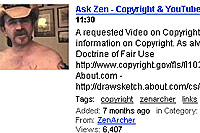 Removing Viacom’s rich portfolio of popular clips may certainly result in loss of revenue for YouTube, but some media analysts reckon it could be a lose-lose situation all round, as both parties risk naffing off consumers.
Removing Viacom’s rich portfolio of popular clips may certainly result in loss of revenue for YouTube, but some media analysts reckon it could be a lose-lose situation all round, as both parties risk naffing off consumers.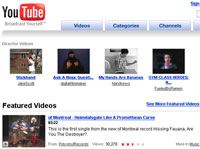 Filmmakers who upload their own movies on to the video-sharing website YouTube will soon be able to enjoy some financial rewards for their efforts.
Filmmakers who upload their own movies on to the video-sharing website YouTube will soon be able to enjoy some financial rewards for their efforts.

 Some MP’s are trying to create brouhaha (fuss) about a spoof video put out by labour MP Sion Simon mocking the first video of Conservative party leader, David Cameron on his Webcameraon site.
Some MP’s are trying to create brouhaha (fuss) about a spoof video put out by labour MP Sion Simon mocking the first video of Conservative party leader, David Cameron on his Webcameraon site. 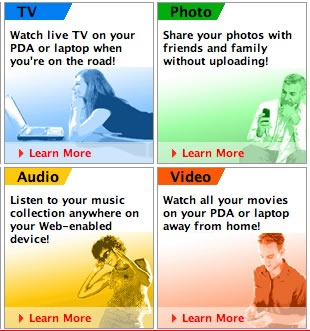 Orb MyCasting has been grabbed by Nokia to be bundled in with the Nokia N80 Internet Edition, in the US only.
Orb MyCasting has been grabbed by Nokia to be bundled in with the Nokia N80 Internet Edition, in the US only.  Google will soon be offering free music videos on its Google video Web site after striking a deal with industry bigwigs, Sony BMG Music Entertainment and Warner Music Group.
Google will soon be offering free music videos on its Google video Web site after striking a deal with industry bigwigs, Sony BMG Music Entertainment and Warner Music Group.  “Our partnership with Google is rooted in the pioneering approach we’ve used to offer fans more music, while benefiting artists and protecting copyrights,” gushed Warner Music in a press release.
“Our partnership with Google is rooted in the pioneering approach we’ve used to offer fans more music, while benefiting artists and protecting copyrights,” gushed Warner Music in a press release.  Google has said that it will be offering further access to Sony and Warner’s hefty audio-visual catalogues in the coming months through partner Web sites in its AdSense network.
Google has said that it will be offering further access to Sony and Warner’s hefty audio-visual catalogues in the coming months through partner Web sites in its AdSense network.  Microsoft is looking to shove its king sized oar into the massive successful user-generated video phenomenon with the launch of an online service to take on the likes of YouTube, Google and Yahoo.
Microsoft is looking to shove its king sized oar into the massive successful user-generated video phenomenon with the launch of an online service to take on the likes of YouTube, Google and Yahoo.  With Microsoft’s vast reserves of cash to fall back on, it’s not surprising that Bennett is chirpy about their prospects, “It’s really early days in online video; this is still act one.”
With Microsoft’s vast reserves of cash to fall back on, it’s not surprising that Bennett is chirpy about their prospects, “It’s really early days in online video; this is still act one.”  Warner Music Group has announced a deal with YouTube to distribute music videos, as well as extras such as band interviews, behind-the-scenes footage and artist rockumentaries.
Warner Music Group has announced a deal with YouTube to distribute music videos, as well as extras such as band interviews, behind-the-scenes footage and artist rockumentaries.  “As user-generated content becomes more prevalent, this kind of partnership will allow music fans to celebrate the music of their favourite artists, enable artists to reach consumers in new ways, and ensure that copyright holders and artists are fairly compensated,” he continued.
“As user-generated content becomes more prevalent, this kind of partnership will allow music fans to celebrate the music of their favourite artists, enable artists to reach consumers in new ways, and ensure that copyright holders and artists are fairly compensated,” he continued. 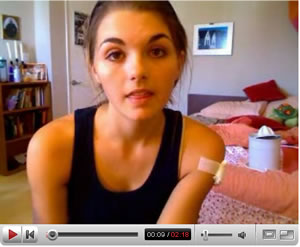 YouTube is continuing to get attention for the content it has on it. Not this time for alleged copyright violations, but for a young girl who has been appearing in videos about the trial and tribulations of her life. Her moniker?
YouTube is continuing to get attention for the content it has on it. Not this time for alleged copyright violations, but for a young girl who has been appearing in videos about the trial and tribulations of her life. Her moniker?  What raised our suspicions? It had always been shot on a video camera, high above a standard Web cam and edited in a self-consciously amateur fashion. The subjects she spoke about appeared just too ideal for the majority-male YouTube – geeky with relationship questions. Of course she was also very attractive. It was also strange that the music that was used in the tracks was always fully credited. We wondered if Bree was eventually going to start talking about products.
What raised our suspicions? It had always been shot on a video camera, high above a standard Web cam and edited in a self-consciously amateur fashion. The subjects she spoke about appeared just too ideal for the majority-male YouTube – geeky with relationship questions. Of course she was also very attractive. It was also strange that the music that was used in the tracks was always fully credited. We wondered if Bree was eventually going to start talking about products. 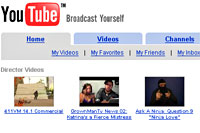 It appears that some people who it also didn’t quite ring true for,
It appears that some people who it also didn’t quite ring true for,  Vodafone is hotly denying that its enthusiasm for 3G has waned, after rumours began circulating that the operator was cutting handset subsidies and abandoned all hope of the technology ever becoming a lucrative commercial success.
Vodafone is hotly denying that its enthusiasm for 3G has waned, after rumours began circulating that the operator was cutting handset subsidies and abandoned all hope of the technology ever becoming a lucrative commercial success.  Video calling
Video calling Not surprisingly, the UK’s only 3G-only network, 3, were quick to quibble about the claims, insisting that the wild popularity of their downloadable music and mobile TV services is proof positive that the demand is there – if the technology is marketed correctly.
Not surprisingly, the UK’s only 3G-only network, 3, were quick to quibble about the claims, insisting that the wild popularity of their downloadable music and mobile TV services is proof positive that the demand is there – if the technology is marketed correctly.